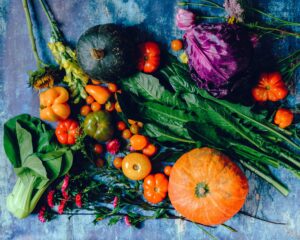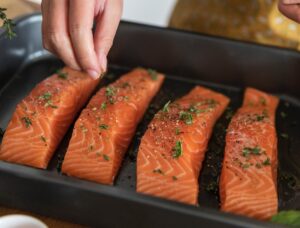How are you feeling? If your honest answer is that you’ve felt happier, then you are not alone. The timing of England’s 3rd national lockdown, in these dark January days, has even affected many people who have not previously had any concerns around their mental health. For those who suffered from depression, anxiety or other mental health concerns before the pandemic, the latest restrictions are a real challenge. If you read my blog because you are also dealing with a physical health diagnosis, then it’s likely that you are already dealing with the stress that comes with that on top of lockdown concerns.
I have noticed that although the mainstream media has focused on mental health and wellbeing, with tips on using exercise and mindfulness to help yourself to feel better, very little has been said about nutrition. Nutritional therapists always recommend a whole person approach to mental health, using strategies such as exercise, spending time in nature, and mindfulness. On top of this, though, we can add another tool to the toolbox – food as medicine.
There is research to back up the fact that what you eat can affect your mood. The results of the SMILES trial, published in 2017, showed that subjects who followed a modified Mediterranean diet (rich in vegetables, fruit, whole grains, oily fish, nuts, legumes and olive oil) were four times more likely to put their major depression into remission than those who were given social support but did not change their diet(1).

Of course, good nutrition will not change these most challenging of circumstances in which we find ourselves. It would be facile to say that food alone will take away all your worries! However, your choice of food can definitely make you feel better or worse – and who wouldn’t like to feel better right now? So here are my 5 top tips for eating your way to good mental health in 2021.
1. Take Care of Your Gut
If you’ve been following me for a while now, you won’t be surprised to hear me say that the health of your gut microbiome is intimately connected to your mental health. A large body of research now exists into the “gut-brain axis”(2). This is the term used to describe the 2-way communication that takes place between the brain and the gut. Most of the information flow is from the gut to the brain, ie what is happening in your gut affects what happens in your brain more than the other way around.
Billions of micro-organisms such as bacteria and fungi, collectively known as your microbiome, live in your large intestine. Good gut health, and good health in general, is linked to a diverse microbiome. How can our food help us support a diverse microbiome?
Many microbes in our gut obtain the energy they need by fermenting fibre that humans cannot digest. Different species prefer different types of fibre, and thrive when these fibres are present in the diet. You can support a diverse microbiome by eating a wide range of plant foods: vegetables, fruit, whole grains, pulses, nuts and seeds, herbs and spices. Some foods are particularly rich in fibres that feed healthy gut bacteria – we call these prebiotics. Prebiotic foods that are good to eat include Jerusalem artichokes, asparagus, oats, seaweed, flax seeds, pulses and green bananas.

You can also support a healthy environment in the gut by eating probiotic foods, which are traditionally fermented foods. Examples of these include kefir, sauerkraut, kombucha and kimchi. Some of these, such as kefir and kombucha, are now widely available in supermarkets, but fermented foods are very easy to make yourself. If you have never eaten them before, start with small amount and increase slowly.
2. Eat the Rainbow
Sometimes there is so much information that it can be easy to overthink nutrition. One easy strategy to ensure that you get a wide variety of the nutrients your body needs is to aim to eat a rainbow of coloured plant foods every day.

Eating plants of all the colours of the rainbow not only helps you to cultivate a diverse gut microbiome (see above), but each different colour indicates different phytonutrients (plant chemicals). These have thousands of benefits within the body! One of these is that compounds called polyphenols (in foods such as berries, herbs, spices, olive oil, vegetables and even in dark chocolate) interact with Brain-Derived Neurotrophic Factor (BDNF), a hormone that directs the flow of food, nourishment and energy to the brain so that it can thrive(3). Some antidepressant drugs work by increasing BDNF; how amazing is it that we can do this without drugs by eating a diverse range of plants?
Most brightly coloured vegetables, fruits, herbs and spices contain anti-inflammatory compounds. Depression can be linked to inflammation within the brain, so reducing inflammation via food can be helpful.
3. Avoid Blood Sugar Spikes
You’ve probably experienced a sugar rush or a sugar crash before (or if not, you’ve probably seen it in small children who eat too many sweets at a party!). When you eat sugar, your blood glucose rises and you might feel good for a short time. However, your body always tries to keep in balance, and it doesn’t like it when your blood glucose is too high, so it tries to bring it down quickly again. It often overshoots, leading to low blood glucose (a sugar crash). This can make you feel dizzy or lightheaded, irritable or hungry…so you reach for a sugary snack and the cycle begins again.
As well as the immediate effects of feeling high and then suddenly low, continual large fluctuations in blood sugar result in inflammation in the body and in the brain. If you remember that inflammation in the brain is linked to depression, you can see that eating a diet high in sugar is one of the worst things that you can do for your mental health.

It’s not just refined sugar that can cause imbalanced blood sugar levels. Eating a diet high in refined carbohydrates (such as white bread, white pasta, pastry and other processed foods), or even large amounts of fruit, can set you off on a blood sugar rollercoaster. Keep your blood sugar (and your brain) balanced by making sure that you choose complex carbohydrates – moderate amounts of whole grains, root vegetables like sweet potatoes, squashes and pulses which release their sugar slowly. Making sure that you eat protein and plenty of fibre with every meal will also help to stabilise your blood glucose. There’s much more detail on this in my eBook, “Eat for Lasting Energy, Focus and Health” which you can download for free here.
4. Think About Your Omega 3s
Omega 3 is an essential fatty acid; it’s so called because your body can’t make it from other fats, so it’s essential that you get it from your diet. Brain cells, like all cells in the body, have membranes that are made of fats. Cell membranes that contain omega 3 fats are fluid, and this allows information in and out of the cells easily. Fluid cell membranes can help with making and breaking down neurotransmitters (brain chemicals). Omega 3 fats also reduce inflammation, including in the brain(4).
You can get omega 3 fats by eating oily fish (think SMASH – salmon, mackerel, anchovies, sardines and herring). Vegetarians and vegans can get smaller amounts of omega 3 from walnuts, flax seeds and chia seeds, or may want to consider taking an algal oil supplement.

5. Quit Processed Foods
All of the interventions above point to eating whole, minimally processed foods. I prefer to concentrate on the positives that you gain from eating whole unprocessed foods, but there are also some negatives that you can avoid by not eating processed foods. By processed foods I’m talking about sugary breakfast cereals, crisps, biscuits, ready meals, and in fact anything with a long list of ingredients. These foods tend to contain high levels of sugar and of inflammatory fats that can drive inflammation in the body. Many additives in processed foods, such as emulsifiers and artificial sweeteners, can also have a negative effect on the gut microbiome(5).
If you’re feeling a bit low, it can be tempting to reach for the easy, processed option. However, your mind and your body will thank you in the end if you make the effort to give them the nourishment that they truly need.

There are lots of other factors that can affect mood. Your individual toxin exposure, nutrient intake, microbiome and genetic predisposition can all impact your mental health. If you’d like to explore your own individual situation more deeply, just give me a call.
References
- Jacka, F.N., O’Neil, A., Opie, R. et al. (2017). “A randomised controlled trial of dietary improvement for adults with major depression (the ‘SMILES’ trial)”, BMC Medicine, 15(1): 23. Available at https://www.ncbi.nlm.nih.gov/pmc/articles/PMC5282719/ (Accessed 22 January 2021).
- Carabotti, M., Scirocco, A., Maseli, M.A. et al. (2015). “The gut-brain axis: interactions between enteric microbiota, central and enteric nervous systems”, Annals of Gastroenterology, 28(2), pp203-209. Available at https://www.ncbi.nlm.nih.gov/pmc/articles/PMC4367209/ (Accessed 22 January 2021).
- Markham, A., Bains, R., Franklin, P. et al. (2014). “Changes in mitochondrial function are pivotal in neurodegenerative and psychiatric disorders: How important is BDNF?”, British Journal of Pharmacology, 171(8), pp2206-2229. Available at https://www.ncbi.nlm.nih.gov/pmc/articles/PMC3976631/ (Accessed 22 January 2021).
- Hsu, M.-C., Huang, Y.-S. and Ouyang, W.-C. (2020). “Beneficial effects of omega-3 fatty acid supplementation in schizophrenia: possible mechanisms”, Lipids in Health and Disease, 19: 159. Available at https://www.ncbi.nlm.nih.gov/pmc/articles/PMC7333328/ (Accessed 22 January 2021).
- Gerasimidis, K., Bryden, K., Chen, X. et al. (2020). “The impact of food additives, artificial sweeteners and domestic hygiene products on the human gut microbiome and its fibre fermentation capacity”, European Journal of Nutrition, 59(7), pp3213-3230. Available at https://www.ncbi.nlm.nih.gov/pmc/articles/PMC7501109/ (Accessed 23 January 2021).

